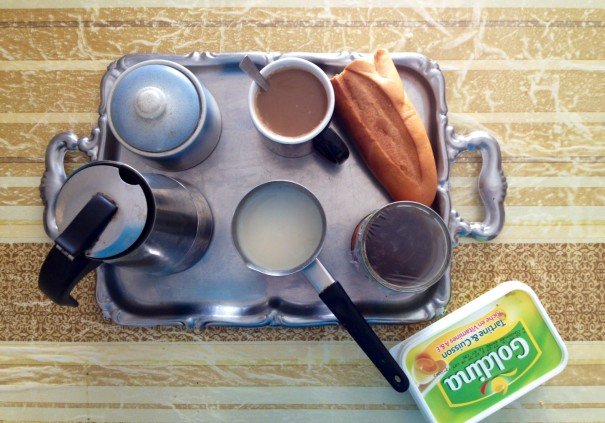
Breakfast with Grandma

Breakfast with Grandma
Breakfast in Tunisia
I am twenty-five years old and I have moved in with my Tunisian grandmother. Though this might seem like a catastrophic blow to the independent, milestone-paved garden path I should be following my fellow millennials down, I can say with total sincerity that I have never felt like more of a star. Just now, I handed Memeti a glass of water, and she did a little dance complete with a shoulder shimmy. Every time I come home from Arabic class, she opens the door in genuine awe that I have managed the half-hour walk alone. If I yawn, she tells me—with an urgency generally reserved for the very sick or heavily pregnant—that I should immediately go lay down.
The disappointed pinches at my flimsy biceps and pokes at my not-flabby-enough stomach are part of this coddled experience. It starts at breakfast. I wake up at 6:30, and as soon as Memeti hears the creak of my door opening, she quite literally leaps out of bed and heads to the kitchen. It does not matter how many times I tell her that I have the stomach of a hibernating tortoise in the morning, or that I have been making myself breakfast (opening yogurt) for the past decade and can manage just fine. There is always a silver tray waiting on the table, crowded with an entire pot of coffee, milk, sugar, a baguette, jam, and margarine.
Breakfast here is a Europeanized affair. After decades of colonization, France withdrew from Tunisia in 1956, leaving behind a few things, including the baguette. It bears a passing physical resemblance to the French bread, though less so in taste. I can usually manage to wolf down one tartine smeared with apricot jam in an effort to placate Memeti. “That’s it?” she always says, though there is little doubt in my mind that were I to eat an entire baguette from end to end, I would hear the same thing. Recently, I awoke with a roiling stomachache and could only manage coffee. My grandmother is eighty-four years old and has survived her husband, three children, French colonialism, poverty, and a revolution. As she looked at me with a gaze of shock and sadness usually reserved for the aforementioned trials, I felt as though I had personally reminded her of her darkest days. I guiltily put a slice of bread in my bag and promised to eat it in class.
Maybe that’s why breakfast with Memeti is also a crash course in bestowing blessings upon your loved ones. My grandmother always starts by thanking me for thanking her for breakfast. Aishack, aish’benti. Then, she blesses my health. Saha, saha. When I bless her health back—yatick’ii saha—she blesses me again. She blesses my father and my mother, and then me once more. As I sit down to eat, she sits down to pray, bestowing peace on her ten children and all of their children. I dunk my bread in coffee and she puckers up an air kiss in my direction for good measure. As I get ready to leave, she holds me close to her and blesses me more, this time for my safety. Rood beleck Saroura, rood beleck Saroura, she repeats, dragging a finger from the bottom of her eyelid across the wrinkly expanse of her right cheek.
By the end, my stomach and soul are so heavily padded that I don’t need to eat anything until I come back home for lunch, when the whole routine starts again.